Top AI for Legal Documents in 2025 | Boost Your Legal Workflow
Level Up Your Legal Game with AI
AI for legal documents is revolutionizing how legal professionals, healthcare providers, and compliance officers work. Drowning in documents? Spending countless hours on research? This list of eight essential AI-powered tools will help you reclaim your time and increase accuracy. Learn how these solutions streamline document analysis, automate research, and simplify legal document creation, giving you a competitive edge. Discover how tools like Whisperit, ROSS Intelligence, and Kira Systems, among others, are transforming legal work.
1. Whisperit: Revolutionizing Legal Document Creation with AI
Whisperit is an AI-powered dictation and text editing platform designed to streamline document creation and case management, particularly for legal and healthcare professionals. Trusted by over 170 lawyers and a growing number of professionals across various industries, Whisperit boasts the ability to accelerate paperwork by up to three times, freeing up valuable time to focus on core responsibilities. Leveraging advanced voice-to-text transcription, natural dictation, and powerful case analysis tools, this platform converts voice memos and uploaded files into clean, structured documents within minutes. This makes it an invaluable tool for those seeking efficient solutions for "ai for legal documents."
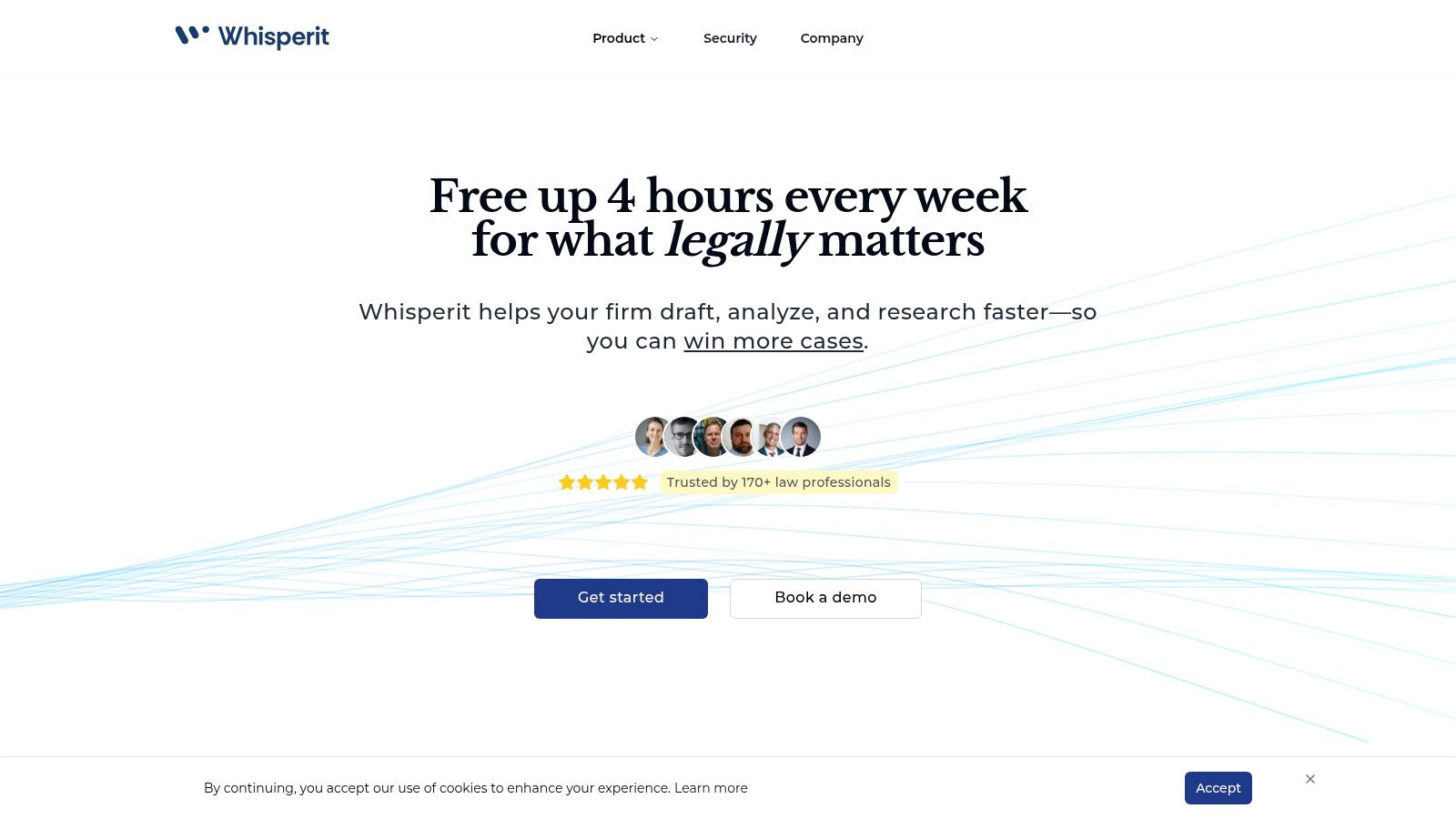
Imagine dictating complex legal briefs on your commute or quickly generating summaries of lengthy case files simply by uploading them. Whisperit makes this a reality. Its AI-powered engine extracts key parties, events, and facts from PDFs and emails, providing instant case insights and facilitating faster decision-making. The platform also boasts precise legal research capabilities, providing jurisdiction-backed answers to complex queries, saving lawyers countless hours of manual research. Real-time collaboration features ensure seamless team workflows, enabling multiple users to work on the same documents simultaneously.
For legal professionals specifically, Whisperit offers a significant advantage in managing the often overwhelming amount of paperwork associated with case preparation. From drafting briefs and contracts to analyzing evidence and conducting legal research, Whisperit streamlines these processes, allowing lawyers to focus on strategy and client interaction. Healthcare providers can benefit from the efficient creation of patient reports, medical histories, and other essential documentation, while compliance officers can leverage the platform for generating reports and ensuring adherence to regulations.
Key Features and Benefits:
- AI-Powered Dictation and Transcription: Convert spoken words and audio files into polished, professional documents quickly and accurately. Supports natural speech patterns and multiple audio import formats.
- Automated Case Analysis: Extract crucial information from PDFs and emails automatically, identifying key parties, dates, and events, allowing for efficient case review.
- Legal Research Assistance: Access jurisdiction-specific legal information and answers, significantly reducing research time.
- Secure Collaboration: Work seamlessly with team members on documents and cases in real-time, ensuring everyone stays updated and informed.
- Robust Security: Data is hosted on encrypted Swiss servers, compliant with GDPR and SOC 2 standards, ensuring confidentiality and data integrity.
Pros:
- Dramatically reduces document creation and case analysis time, boosting overall productivity.
- Robust AI-powered dictation and transcription support natural speech and multiple audio imports.
- Advanced document analysis extracts key parties, events, and facts instantly, aiding faster decision-making.
- Highly secure with Swiss-based encrypted hosting, GDPR, and SOC 2 compliance ensuring global data privacy.
- Real-time collaboration with team members across cases and documents streamlines workflows.
Cons:
- Pricing details are not publicly available, requiring users to book a demo for a tailored quote.
- While suitable for various professionals, its primary focus on legal and healthcare might limit specific features for other specialized industries.
Implementation and Setup:
While specific technical requirements are not publicly detailed, the platform appears to be web-based, suggesting minimal local installation. Users likely interact with the platform through a web browser, simplifying access and collaboration. A demo is recommended to understand the full setup and integration process.
Why Whisperit Deserves its Place:
Whisperit stands out for its comprehensive approach to AI-powered document management, specifically catering to the demanding needs of legal and healthcare professionals. Its focus on security, efficiency, and collaboration makes it a powerful tool in today's fast-paced professional environment. The potential cost savings, as evidenced by the reported CHF 750,000 saved annually by one law firm, further solidifies its value proposition.
Website: https://whisperit.ai
2. ROSS Intelligence
ROSS Intelligence was a pioneering AI-powered legal research platform designed to streamline the often tedious process of finding relevant case law and statutes. Leveraging natural language processing (NLP), ROSS allowed legal professionals to pose questions in plain English, much like interacting with a colleague or a search engine, and receive precise answers supported by pertinent legal documents. This approach stood in stark contrast to traditional keyword-based searches, offering a more intuitive and efficient way to navigate complex legal databases. ROSS aimed to significantly reduce research time by analyzing thousands of cases in seconds, surfacing the most relevant results and potentially saving lawyers countless hours. While ROSS Intelligence itself is no longer operational, its innovative approach paved the way for modern AI-powered legal research tools. Understanding its features and benefits provides valuable context for exploring current solutions available in the market.
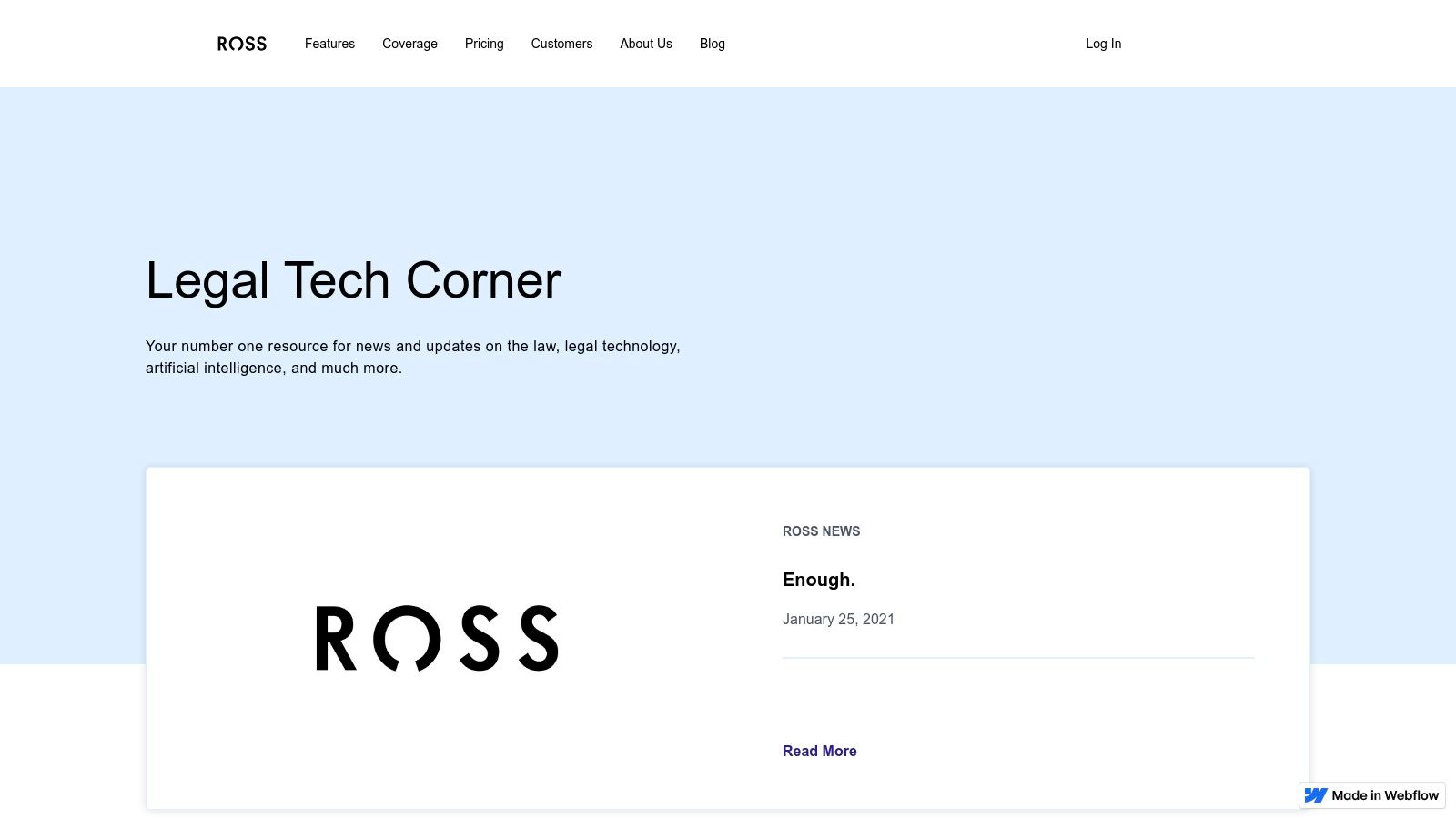
ROSS Intelligence differentiated itself through several key features: its natural language processing interface made legal research more intuitive, automated document analysis and categorization helped organize information efficiently, and a case law recommendation engine based on contextual understanding provided highly relevant results. Real-time updates on changing legislation and precedents ensured lawyers had access to the most current information. Furthermore, integration with existing legal document management systems offered a seamless workflow. For instance, a lawyer specializing in contract law could ask ROSS, "What are the legal implications of force majeure clauses in commercial leases in California during a pandemic?" and receive a curated list of relevant cases and statutes within seconds. This ability to quickly access pertinent information made ROSS a valuable tool for legal professionals across various specializations.
The platform offered several advantages, most notably a significant reduction in research time compared to traditional methods. This efficiency translated to increased productivity and cost savings. ROSS also aimed to improve the accuracy of legal research by identifying relevant case law that might be missed through keyword searches. Its user-friendly interface required minimal training, allowing lawyers to quickly integrate the tool into their workflow. Being a continuously learning system, ROSS was designed to improve its performance over time, adapting to the nuances of legal language and evolving legal landscapes.
However, ROSS Intelligence also faced certain limitations. The subscription cost could be prohibitive for smaller firms or solo practitioners. Its jurisdiction coverage, while extensive, was not as comprehensive as some competitors. Full functionality required a stable internet connection, which could be a drawback in areas with limited connectivity. Finally, while innovative and powerful, ROSS was not intended to entirely replace traditional legal research methods, especially for highly complex cases requiring nuanced legal interpretation. You can learn more about ROSS Intelligence and related AI-driven research techniques. While ROSS is no longer available, its impact on the field underscores the potential of AI for legal documents and the continuing evolution of legal research technology. Exploring current alternatives with similar functionalities, considering factors like pricing, jurisdiction coverage, and integration capabilities, is essential for legal professionals seeking to leverage the power of AI in their practice.
3. Kira Systems
Kira Systems is a leading AI-powered contract analysis software designed to streamline legal document review. Leveraging machine learning, Kira automatically extracts and analyzes key provisions within contracts and other legal documents, significantly reducing the time and effort required for tasks like due diligence, contract management, and compliance. This makes it a powerful tool for legal professionals involved in M&A transactions, contract migration, regulatory compliance, and general contract review. Its ability to identify and analyze hundreds of provisions across thousands of documents with high accuracy positions it as a valuable asset in the realm of AI for legal documents.
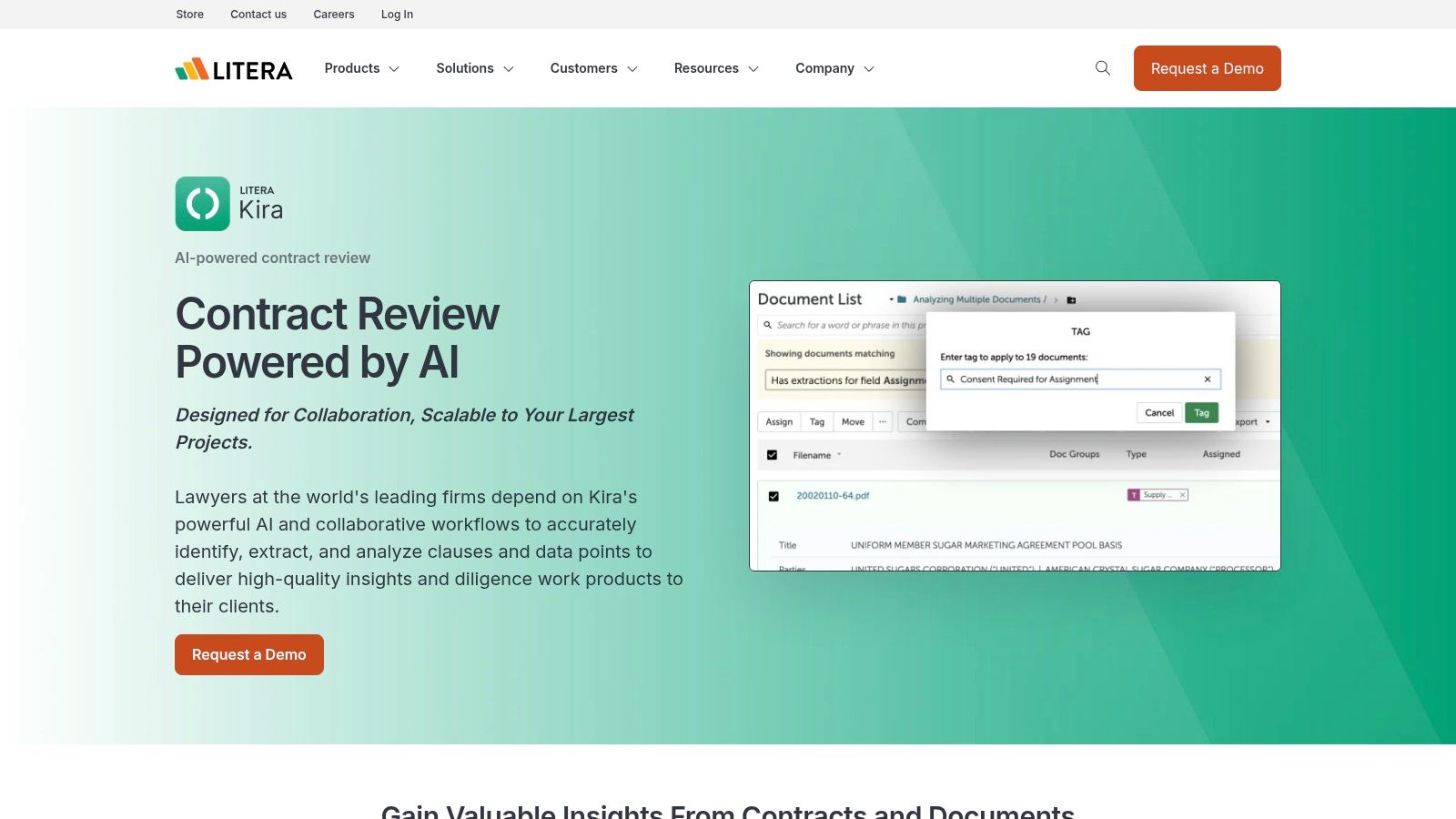
Specifically, Kira Systems excels in automating the tedious process of manual contract review. Imagine having to review thousands of pages of contracts during a merger or acquisition – Kira can drastically reduce the time needed for this process, freeing up legal professionals to focus on more strategic work. For Healthcare Providers, Kira can assist with analyzing complex agreements, ensuring compliance, and managing risk. Security and Compliance Officers can leverage Kira's powerful capabilities to identify critical clauses related to data privacy and security, helping organizations mitigate potential vulnerabilities.
Features of Kira Systems include automated contract provision extraction and analysis fueled by built-in machine learning models trained on thousands of documents. These models allow for high accuracy in identifying and extracting relevant information. Furthermore, the platform allows for customizable extraction models to meet organization-specific needs. This customization allows legal teams to tailor Kira to their specific practice areas and document types. The ability to batch process large document sets is essential for handling the volume of paperwork involved in many legal processes. Finally, comparison tools help identify discrepancies between contracts, ensuring consistency and accuracy.
Pros:
- High accuracy in extracting information from contracts.
- Significant time-saving in due diligence and contract review processes.
- Flexible and customizable to different legal practice areas.
- Comprehensive audit trails for quality control.
Cons:
- Substantial implementation and training may be required to maximize the software's potential.
- The user interface can be complex, resulting in a steep learning curve for some users.
- A premium pricing model may be prohibitive for smaller organizations.
- Some customization requires technical expertise.
While pricing information isn't readily available, it's worth noting that Kira Systems is generally considered a premium solution. Learn more about Kira Systems and other AI-powered legal tech solutions. Implementation typically involves working with Kira Systems' team for initial setup, model training, and user training. Technical requirements will vary depending on the specific implementation and deployment model.
Kira Systems deserves its place on this list due to its robust functionality, high accuracy, and focus on complex contract analysis. Compared to other AI tools for legal documents, Kira stands out with its advanced machine learning capabilities and its ability to handle large-scale document review. For organizations dealing with high volumes of complex contracts, the time savings and increased accuracy offered by Kira can be invaluable. For more detailed insights into the future of AI in legal tech, you might find this article helpful: Learn more about Kira Systems. Its powerful features and customization options make it a worthwhile investment for legal teams looking to leverage AI for document review and analysis. Finally, visiting the Kira Systems website (https://www.kirasystems.com/) will provide further details and allow you to explore the platform in more depth.
4. LexisNexis Lexis+ AI
LexisNexis Lexis+ AI stands as a powerful contender in the realm of AI for legal documents. It seamlessly blends the extensive legal resources of LexisNexis with cutting-edge AI capabilities, providing legal professionals with an all-in-one platform for research, analysis, and document drafting. This integration of AI within a trusted legal database makes Lexis+ AI particularly valuable for complex legal tasks, offering efficiency and insights that traditional methods often miss. Imagine effortlessly navigating through vast legal precedents, quickly identifying key cases relevant to your current brief, and even receiving AI-powered assistance in crafting persuasive legal arguments. Lexis+ AI makes these scenarios a reality.

A core strength of Lexis+ AI lies in its robust feature set. The AI-powered legal research employs natural language processing, allowing users to pose complex legal questions in plain English and receive highly relevant results. This streamlines the research process significantly, saving valuable time and resources. The Brief Analysis tool further enhances efficiency by automatically scrutinizing legal briefs, uncovering potentially overlooked cases, statutes, and analytical points that could prove crucial to a case. Beyond research, Lexis+ AI offers practical guidance with AI-assisted document drafting, helping legal professionals generate accurate and persuasive documents quickly. Features like predictive analytics for case outcome assessment and interactive visualization tools for exploring case law connections add further layers of insight and strategic advantage.
For legal professionals already familiar with the LexisNexis ecosystem, the integration of AI within Lexis+ provides a seamless transition. The platform benefits from regular updates, ensuring access to the most current case law and legislation. Furthermore, LexisNexis provides robust support and training resources to help users maximize the platform's potential. However, this powerful tool comes at a premium price point, potentially posing a barrier for smaller firms or solo practitioners. The platform's complexity, while offering a wealth of features, can also be overwhelming for new users, requiring a dedicated learning curve. While pricing information isn't readily available on the website, it's likely structured around modular subscriptions, meaning users may need to subscribe to multiple modules to unlock full functionality, potentially adding to the overall cost. Some advanced features may also incur additional costs.
Despite the higher price point and complex interface, Lexis+ AI earns its place on this list due to its comprehensive nature and integration with a trusted legal database. Its advanced features, particularly the Brief Analysis and AI-assisted document drafting tools, offer significant advantages for legal professionals handling complex litigation or transactional work. For those deeply embedded in the LexisNexis environment, the platform provides a natural progression into the future of AI-powered legal research and analysis. Healthcare providers and security and compliance officers dealing with intricate legal and regulatory landscapes can also leverage Lexis+ AI to navigate complex legal research and ensure compliance with relevant laws and regulations. To explore the platform and its offerings, visit the LexisNexis website at https://www.lexisnexis.com/en-us/products/lexis-plus.page.
5. DocuSign CLM with AI
DocuSign CLM with AI offers a comprehensive solution for managing the entire contract lifecycle, leveraging artificial intelligence to streamline processes and mitigate risks. This platform goes beyond simple e-signatures, using AI to analyze contracts for potential legal issues, automate tedious tasks, and provide valuable insights across your contract portfolio. This makes it a powerful tool for legal professionals, healthcare providers, and security and compliance officers looking to improve efficiency and reduce risk. For organizations already invested in the DocuSign ecosystem, the seamless integration with other DocuSign tools makes CLM with AI a natural extension of existing workflows.
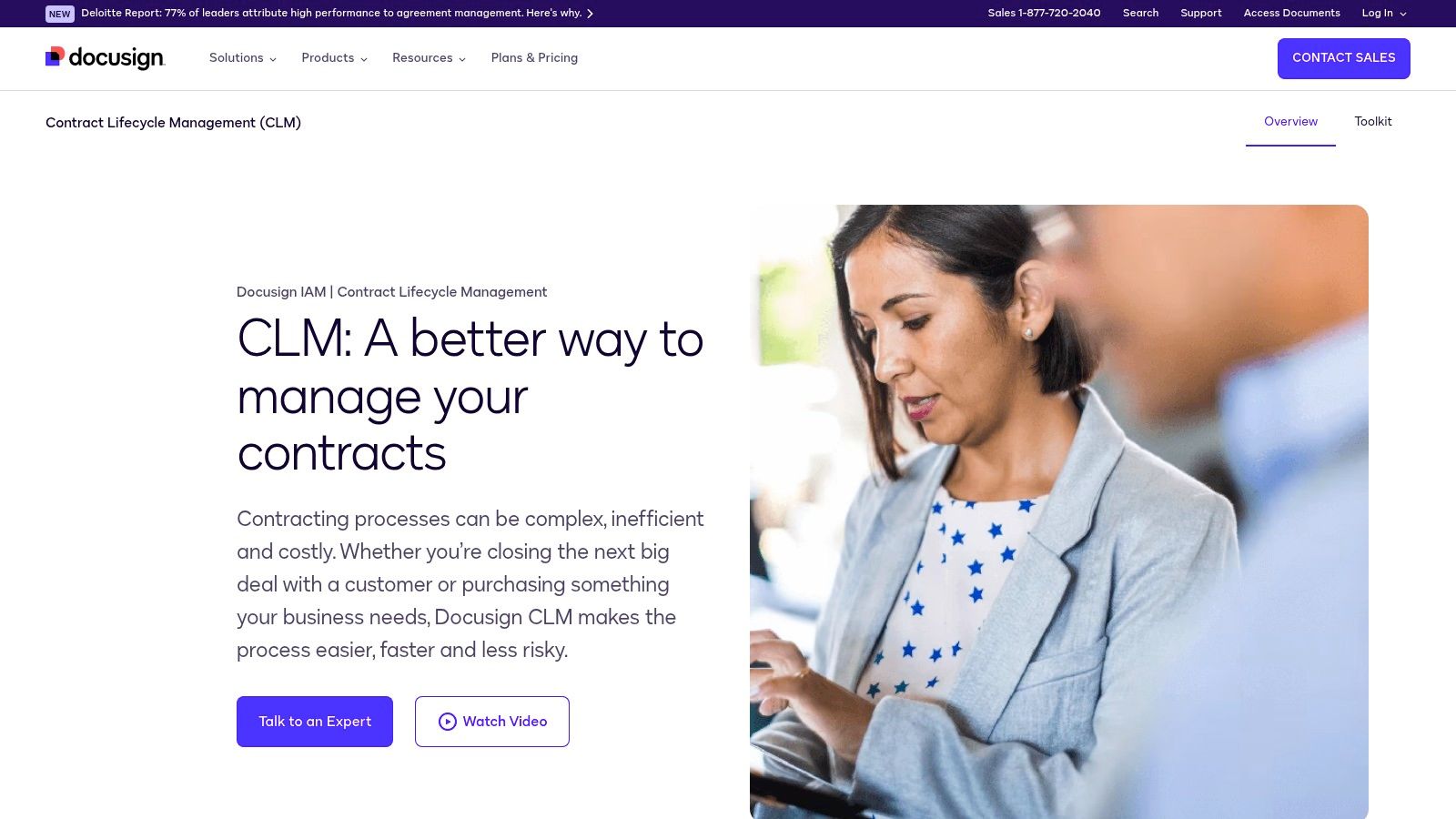
Specifically, DocuSign CLM with AI excels in automating routine tasks such as contract creation through automated template selection and clause insertion. Its AI-powered analysis identifies potential risks and obligations, helping legal teams proactively address potential issues before they escalate. For example, the AI can flag unfavorable clauses, missing provisions, or inconsistencies across multiple agreements. Furthermore, the platform facilitates obligation management by automatically extracting key obligations and deadlines, ensuring compliance and preventing breaches. Automated renewal and expiration alerts minimize the risk of missed deadlines and unwanted auto-renewals. These AI-driven features significantly reduce manual review time, allowing legal professionals to focus on more strategic work.
While DocuSign doesn't publicly list pricing, it's generally understood to be a premium solution, with costs varying based on the specific features and scale of implementation. Learn more about DocuSign CLM with AI for further insights into its applications. It's worth noting that implementation can be complex and may require dedicated resources and time, particularly for large organizations with complex contract workflows. Organizations already using other legal tech tools might find some features redundant. Additionally, while the platform boasts robust AI capabilities, configuring some of the more advanced AI features may require specialized knowledge or assistance from DocuSign.
Despite these potential drawbacks, the benefits of a fully integrated contract lifecycle management solution with embedded AI are compelling. DocuSign CLM with AI offers a powerful platform for organizations seeking to enhance efficiency, reduce risk, and gain deeper insights into their contract portfolio. Its integration with the broader DocuSign Agreement Cloud further strengthens its value proposition, especially for organizations already leveraging DocuSign's eSignature platform. This integration streamlines workflows and provides a centralized platform for managing all agreement-related activities. While the cost and implementation complexity might be a barrier for some, the potential long-term benefits in terms of time savings, risk mitigation, and improved compliance make DocuSign CLM with AI a worthy contender in the "AI for legal documents" space. It deserves its place on this list for its comprehensive features, strong security, and seamless integration with the wider DocuSign ecosystem, making it a particularly attractive solution for existing DocuSign users.
6. Casetext CARA A.I.
Casetext's CARA A.I. (Case Analysis Research Assistant) stands out as a powerful AI-driven tool specifically designed to streamline legal research. Unlike keyword-based searches on traditional platforms, CARA leverages advanced AI to analyze the context of your legal documents and pinpoint relevant case law, statutes, and regulations. This contextual approach allows legal professionals, healthcare providers dealing with legal complexities, and security and compliance officers navigating regulatory landscapes to efficiently uncover precedents they might otherwise miss. Imagine uploading a complex brief and having CARA automatically identify the key legal issues and present you with a curated list of on-point cases – including those your opposing counsel might have overlooked. This is the power of AI for legal documents.
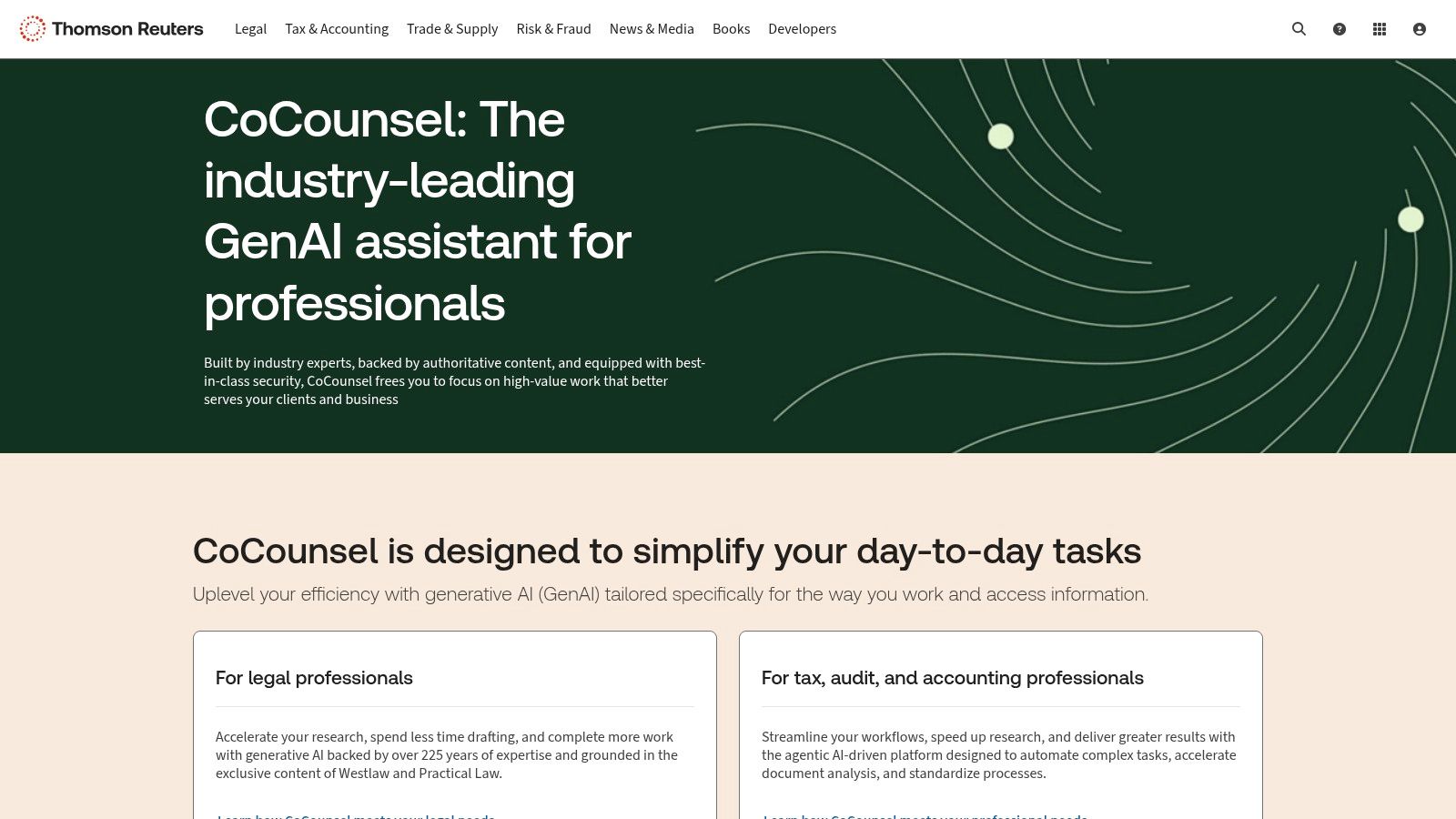
CARA's functionality extends beyond simple case retrieval. Its Parallel Search feature allows users to find factually analogous cases, strengthening their legal arguments and providing a broader perspective on how similar situations have been handled in the past. This is crucial for developing winning strategies and anticipating potential challenges. The integrated SmartCite feature automates citation checking, ensuring accuracy and saving valuable time. Furthermore, the Compose feature offers AI-assisted document drafting, helping legal professionals generate high-quality legal documents efficiently. Learn more about Casetext CARA A.I. provides additional context on how AI is transforming legal document analysis.
While Casetext CARA A.I. offers an intuitive interface and innovative research capabilities, it's important to consider its limitations. Its database, while robust, may not be as extensive as those of legacy legal research platforms. International jurisdiction coverage is also limited, making it primarily suitable for US-based legal professionals. Some advanced features, like Compose, require higher subscription tiers. Finally, while CARA excels in case law research, its focus is less pronounced in other areas like statutory or regulatory research.
Despite these limitations, Casetext CARA A.I. earns its place on this list due to its innovative approach to legal research, user-friendly interface, and more affordable pricing compared to traditional platforms. Its regular updates and addition of new AI-powered features demonstrate Casetext's commitment to evolving with the changing needs of the legal profession. For legal professionals seeking an AI-powered tool to enhance their research efficiency and uncover critical case law connections, Casetext CARA A.I. is a worthwhile option. You can explore the platform and its features further on their website: https://casetext.com/. While specific pricing isn't publicly listed, it’s generally considered more competitive than established alternatives. Contact Casetext directly for detailed pricing and to determine the best plan for your needs. No specialized technical requirements are mentioned for utilizing the platform, suggesting accessibility across various devices and operating systems.
7. Luminance
Luminance distinguishes itself as a leading AI platform specifically designed for the legal profession, leveraging machine learning to revolutionize how legal teams interact with contracts and other vital documents. Its core strength lies in its ability to rapidly sort, cluster, and classify large volumes of documents, effectively highlighting anomalies and potential issues that might otherwise be missed. This positions Luminance as an invaluable tool for tasks like due diligence, regulatory compliance reviews, and in-depth contract analysis, enabling legal professionals to navigate complex document sets with unprecedented speed and accuracy. This AI-powered approach empowers legal teams to focus their expertise on strategic decision-making rather than time-consuming manual review, making it a powerful addition to any legal tech stack. The platform's proprietary LITE (Legal Inference Transformation Engine) technology further enhances its capabilities by adapting to diverse languages and legal jurisdictions, ensuring its global applicability in the increasingly interconnected legal landscape.
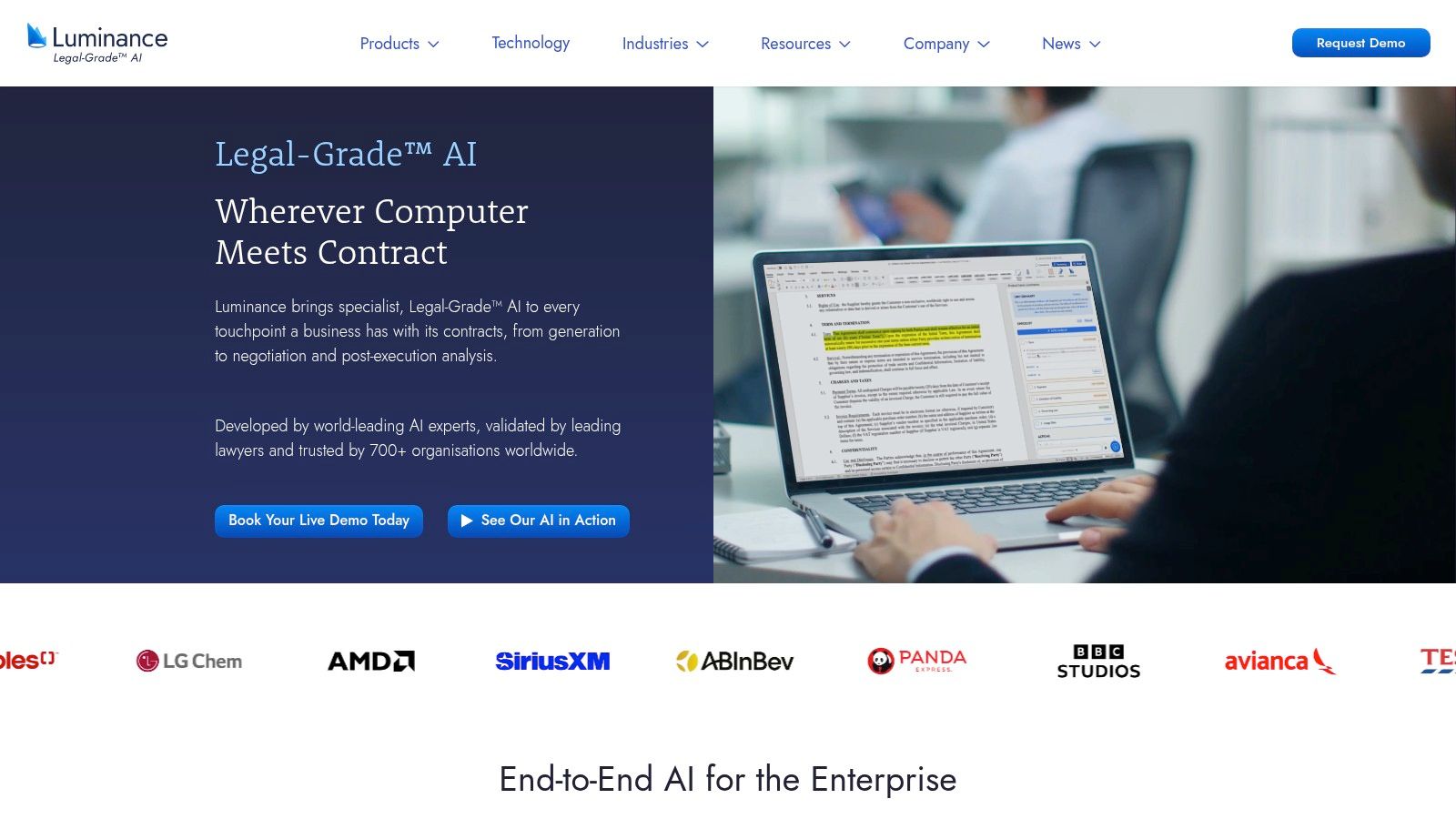
Consider a large-scale M&A transaction where thousands of contracts need to be reviewed for potential risks and liabilities. Luminance can drastically reduce the time required for this process, allowing legal teams to identify key clauses, inconsistencies, and areas of concern far more efficiently than traditional manual review. Similarly, in compliance reviews, Luminance can automatically flag clauses that deviate from regulatory requirements, ensuring adherence to industry standards and minimizing the risk of penalties. Its conceptual understanding of documents allows it to identify relevant information regardless of the specific terminology used, making it particularly effective for cross-border transactions and multilingual document sets. For example, a healthcare provider dealing with international patient agreements can leverage Luminance to analyze documents in multiple languages, ensuring consistent interpretation and adherence to regulations. Security and Compliance Officers can also benefit from Luminance's ability to quickly identify sensitive data within large document sets, aiding in data breach prevention and compliance with data privacy regulations. Learn more about Luminance and the evolving landscape of legal document management.
Luminance's standout features include automated document clustering and classification, anomaly detection to pinpoint unusual clauses or provisions, language-agnostic analysis supporting over 80 languages, and visual data presentation through interactive dashboards. This visualization capability significantly simplifies the review process, providing a clear overview of document relationships and potential issues. The platform also adapts to user interactions, refining its performance over time and improving accuracy based on user feedback. While Luminance offers significant advantages for AI for legal documents, it's worth noting that its premium pricing structure may present a challenge for smaller organizations. Furthermore, its primary focus is on document review, not comprehensive end-to-end contract management. Optimal performance requires high-quality document scans, and some specialized industries might require customization. Despite these considerations, Luminance earns its place in this list due to its powerful AI-driven analysis, multilingual capabilities, and user-friendly interface, making it a valuable asset for legal professionals seeking to enhance efficiency and accuracy in document review. You can explore more about Luminance on their website.
8. Clause (DocuSign)
Clause, now integrated into the DocuSign Agreement Cloud, offers a pioneering approach to contract management using AI for legal documents. This platform moves beyond static agreements by transforming them into dynamic, self-executing smart contracts. This allows legal professionals, healthcare providers, and security and compliance officers to automate agreement execution and management, significantly increasing efficiency and reducing risk.
Clause connects legal agreements to real-world data sources and systems. This allows for dynamic clauses that automatically update based on predefined conditions. Imagine a supply contract where the price automatically adjusts based on fluctuating market rates or a healthcare agreement where insurance payouts are triggered based on verified medical data. These are the types of automated processes Clause enables, driving significant efficiency gains and minimizing the need for manual intervention.
Key Features and Benefits:
- Dynamic Clauses: Real-time updates based on external data triggers, eliminating manual adjustments and reducing discrepancies.
- Automated Performance Tracking: Track contract obligations and milestones automatically, improving compliance and simplifying reporting.
- Integration with External Systems: Connect contracts with ERP, CRM, and other business systems for seamless data flow and automated actions.
- Blockchain Integration: Enhanced security and transparency through distributed ledger technologies for specific use cases requiring immutability.
- Pre-built Templates: Accelerate smart contract creation with templates for common legal agreements.
- DocuSign Integration: Leverages the power of the DocuSign ecosystem for a streamlined agreement process from creation to execution and management.
Practical Applications and Use Cases:
- Supply Chain Management: Automate order fulfillment, payments, and inventory adjustments based on real-time data.
- Healthcare: Automate insurance claims processing based on verified medical events and data.
- Financial Services: Streamline loan agreements and automate payments based on market conditions or borrower performance.
- Real Estate: Automate lease agreements and rent adjustments based on property value fluctuations or other agreed-upon metrics.
- Legal Operations: Automate document generation, review, and approval workflows, reducing manual effort and improving turnaround times.
Pros:
- Pioneering Technology: Leads the way in dynamic and connected contracts, offering significant potential for innovation in legal document management.
- Efficiency Gains: Automating contract processes reduces manual effort, freeing up legal and other professionals for more strategic tasks.
- Reduced Risk: Minimizes errors associated with manual contract monitoring and enforcement, improving compliance and reducing legal disputes.
- DocuSign Integration: Seamless integration with the broader DocuSign ecosystem enhances functionality and streamlines the entire agreement lifecycle.
Cons:
- Complexity: Implementing smart contracts can be complex, requiring technical expertise and careful planning.
- Suitability: Not all contract types are equally suitable for smart contract functionality. Simple agreements may not benefit significantly.
- Process Changes: Organizations may need to adapt their existing processes to fully realize the benefits of smart contracts.
- Evolving Standards: As a relatively new technology, best practices and standards for smart contracts are still evolving.
Pricing and Technical Requirements:
Pricing information for Clause is available through DocuSign directly, as it's now part of their product suite. Technical requirements will vary depending on the complexity of the smart contract implementation and integration needs. It is best to contact DocuSign for specific details.
Implementation Tips:
- Start with a pilot project to test the technology and identify any potential challenges.
- Clearly define the scope and objectives of your smart contract implementation.
- Involve both legal and technical teams in the planning and implementation process.
- Consider engaging with experienced smart contract consultants for guidance.
Comparison with Similar Tools:
While other tools offer aspects of contract automation, Clause's integration with external data sources and dynamic clause execution makes it particularly powerful. Tools like Ironclad and Agiloft focus primarily on contract lifecycle management, while Clause enables a more active and responsive approach to contract execution.
Why Clause Deserves Its Place on this List:
Clause’s innovative approach to AI-powered contract management transforms traditional static documents into dynamic, self-executing agreements. This represents a significant step towards the future of legal agreements, offering substantial benefits in efficiency, risk reduction, and automation. For legal professionals, healthcare providers, and compliance officers looking to leverage AI for legal documents and optimize contract management, Clause is a powerful solution worth considering. Visit Clause (now part of DocuSign) for more information.
AI Legal Document Tools Comparison
| Platform | Core Features/Capabilities | User Experience & Quality | Value Proposition | Target Audience | Price & Access |
|---|---|---|---|---|---|
| Whisperit 🏆 | AI dictation, transcription, case analysis, real-time collaboration ✨ | ★★★★☆ Highly intuitive, fast | 💰 Tailored pricing; boosts productivity up to 3x | 👥 Legal, healthcare, compliance | Private pricing, demo required |
| ROSS Intelligence | NLP legal research, document analysis, case recommendations | ★★★★☆ User-friendly, minimal training | 💰 Subscription-based; costly for small firms | 👥 Legal professionals | Subscription |
| Kira Systems | Contract provision extraction, ML models, batch processing | ★★★★☆ Accurate but complex UI | 💰 Premium pricing; high implementation effort | 👥 Legal, M&A, compliance | Premium, technical setup required |
| LexisNexis Lexis+ AI | AI legal research, brief analysis, predictive analytics | ★★★★☆ Comprehensive but complex | 💰 High price; extensive database & support | 👥 Legal researchers & firms | Subscription, modular costs |
| DocuSign CLM with AI | Contract lifecycle automation, risk analysis, obligation tracking | ★★★★☆ Robust but complex to set up | 💰 Premium, additional config cost | 👥 Enterprises & legal teams | Enterprise pricing |
| Casetext CARA A.I. | Brief analyzer, Parallel Search, citation checking | ★★★★☆ Intuitive, affordable | 💰 More affordable; regularly updated | 👥 Legal professionals | Subscription tiers |
| Luminance | Document clustering, anomaly detection, multi-language analysis | ★★★★☆ No training needed, visual | 💰 Premium pricing; strong multilingual support | 👥 Legal, compliance teams | Premium |
| Clause | Smart contracts, dynamic clauses, blockchain integration | ★★★☆☆ Innovative but complex | 💰 Emerging; efficiency gains via automation | 👥 Legal tech adopters | Varies, technical implementation |
Embrace the Future of Legal Tech
AI is rapidly transforming the legal landscape, and the eight tools discussed—Whisperit, ROSS Intelligence, Kira Systems, LexisNexis Lexis+ AI, DocuSign CLM with AI, Casetext CARA A.I., Luminance, and Clause—demonstrate the power of AI for legal documents. These platforms offer diverse solutions, addressing critical needs from contract analysis and due diligence to legal research and compliance monitoring. By understanding the strengths of each tool, legal professionals, healthcare providers, and security and compliance officers can strategically leverage AI to enhance their work. Key takeaways include the potential for significant time savings, reduced costs, and improved accuracy in handling legal documents.
Choosing the right tool hinges on your specific needs and priorities. Consider factors like the size of your organization, the types of legal documents you frequently work with, and your budget. For example, if you're focused on streamlining contract lifecycle management, a tool like DocuSign CLM with AI might be a good fit. If in-depth legal research is your primary need, platforms like ROSS Intelligence or LexisNexis Lexis+ AI might be more suitable. If you're looking to automate the creation of legal documents, you might explore options discussed in this guide to the best legal document automation software from Documind. This resource provides a comprehensive overview of top legal document automation software tools for 2025, helping you further refine your automation strategy. Implementing AI tools requires careful planning and integration with existing workflows for optimal results.
The future of legal work is here, and AI is at its core. By embracing these technologies, legal professionals can not only improve their efficiency and accuracy but also gain valuable insights and unlock new possibilities within their practice. Ready to experience the transformative power of AI in legal document processing? Explore Whisperit, an innovative platform designed to simplify and enhance your work with legal documents through AI-powered features. Whisperit's advanced capabilities are tailor-made to help legal professionals navigate the complexities of legal documents efficiently and effectively.